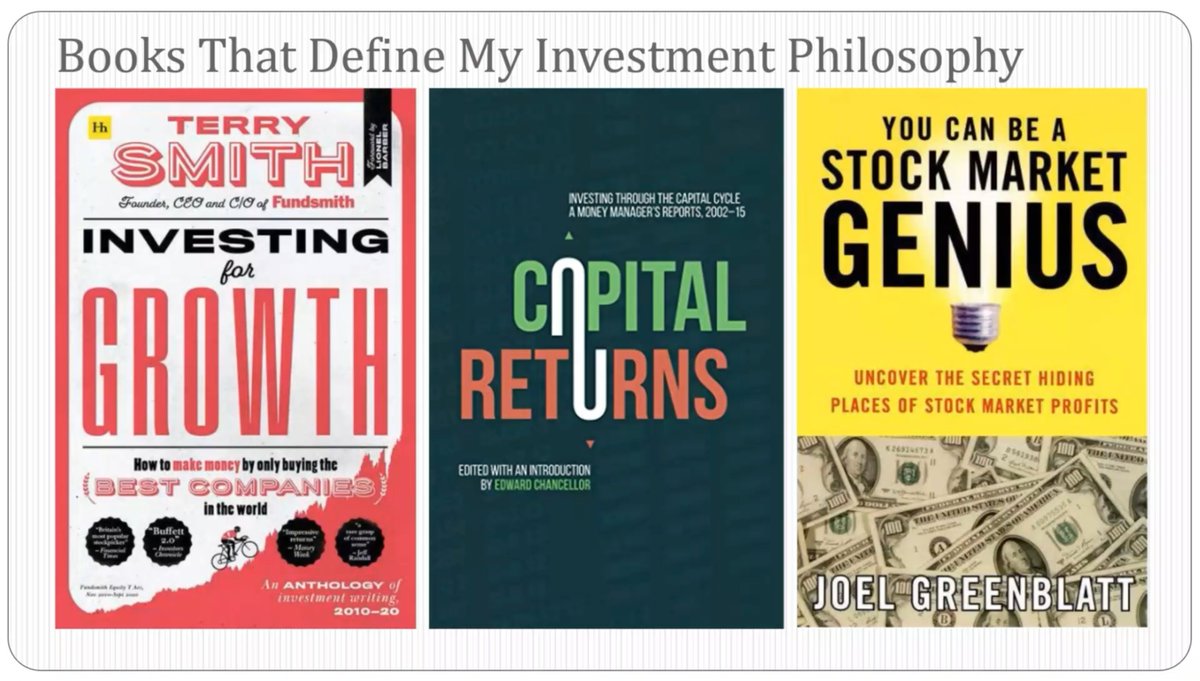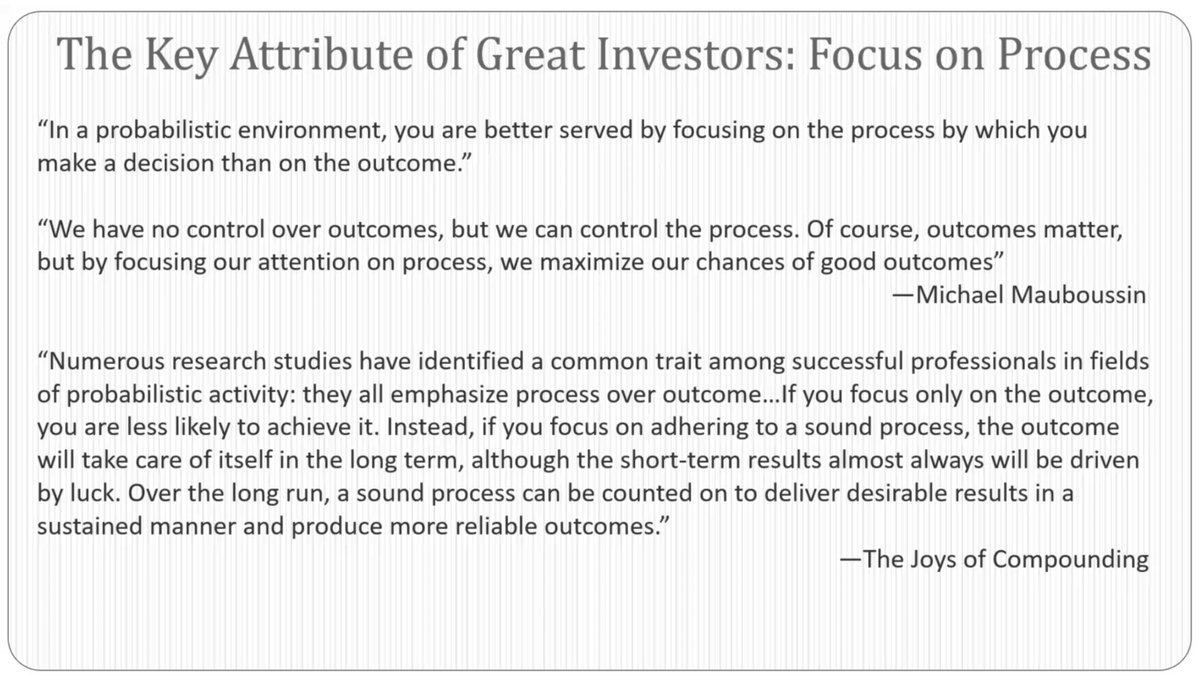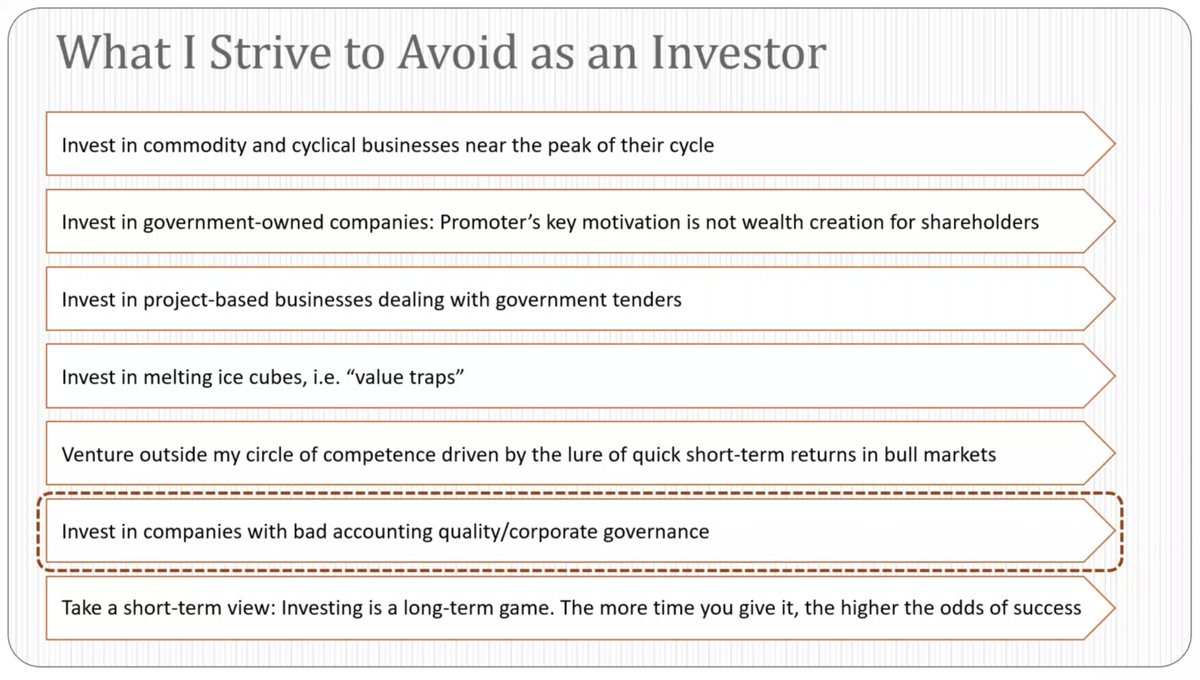
What a privilege it was to host @Gautam__Baid for my first ever Twitter Spaces event along with @dadalife369 and @Finvents.
While we wait for the YouTube recording. Here are 8 of my biggest takeaways from today's session.
#investing

Here are three books that influence @Gautam__Baid's investing style - They are some of the best books in investing along with Gautam's The Joys of Compounding.

Here are the ones @Gautam__Baid uses.
It is a super-comprehensive list.

Developing a superior process leads to the repeatability of exceptional outcomes.

Example - @Gautam__Baid's multi-pronged approach to idea generation and validation.

Here is @Gautam__Baid's list of things to avoid.

Here is @Gautam__Baid's checklist that makes this job a bit more process-driven and easier to execute.
https://t.co/ROZ6k8DTy8
Today's spaces and WebEx presentation with @Gautam__Baid has been packed with so much insight. Check out this slide on corporate governance, for example, it is a goldmine for investors.@Finvents @dadalife369 #investing pic.twitter.com/Teyr4jm45N
— Krishna Bahirwani (@BahirwaniKrish) December 8, 2021
More from Wise investing
Great post. Lots of similarities with how you invest and successful microcap investing. The first bet is about the broad strokes. The subsequent bets is when you see the details fill in and average up. Buy low and then don’t be afraid to buy higher - sometimes aggressively.
Spoke to a group of students from London School of Economics this morning. So many great questions. As usual, multiple Qs gravitate around \u201chow do you know?\u201d Or how did you know or how could you know? It\u2019s the reason I wrote this. https://t.co/aECMjIFxw0
— Ho Nam (@honam) June 27, 2021
You May Also Like
I just finished Eric Adler's The Battle of the Classics, and wanted to say something about Joel Christiansen's review linked below. I am not sure what motivates the review (I speculate a bit below), but it gives a very misleading impression of the book. 1/x
The meat of the criticism is that the history Adler gives is insufficiently critical. Adler describes a few figures who had a great influence on how the modern US university was formed. It's certainly critical: it focuses on the social Darwinism of these figures. 2/x
Other insinuations and suggestions in the review seem wildly off the mark, distorted, or inappropriate-- for example, that the book is clickbaity (it is scholarly) or conservative (hardly) or connected to the events at the Capitol (give me a break). 3/x
The core question: in what sense is classics inherently racist? Classics is old. On Adler's account, it begins in ancient Rome and is revived in the Renaissance. Slavery (Christiansen's primary concern) is also very old. Let's say classics is an education for slaveowners. 4/x
It's worth remembering that literacy itself is elite throughout most of this history. Literacy is, then, also the education of slaveowners. We can honor oral and musical traditions without denying that literacy is, generally, good. 5/x
As someone\u2019s who\u2019s read the book, this review strikes me as tremendously unfair. It mostly faults Adler for not writing the book the reviewer wishes he had! https://t.co/pqpt5Ziivj
— Teresa M. Bejan (@tmbejan) January 12, 2021
The meat of the criticism is that the history Adler gives is insufficiently critical. Adler describes a few figures who had a great influence on how the modern US university was formed. It's certainly critical: it focuses on the social Darwinism of these figures. 2/x
Other insinuations and suggestions in the review seem wildly off the mark, distorted, or inappropriate-- for example, that the book is clickbaity (it is scholarly) or conservative (hardly) or connected to the events at the Capitol (give me a break). 3/x
The core question: in what sense is classics inherently racist? Classics is old. On Adler's account, it begins in ancient Rome and is revived in the Renaissance. Slavery (Christiansen's primary concern) is also very old. Let's say classics is an education for slaveowners. 4/x
It's worth remembering that literacy itself is elite throughout most of this history. Literacy is, then, also the education of slaveowners. We can honor oral and musical traditions without denying that literacy is, generally, good. 5/x














